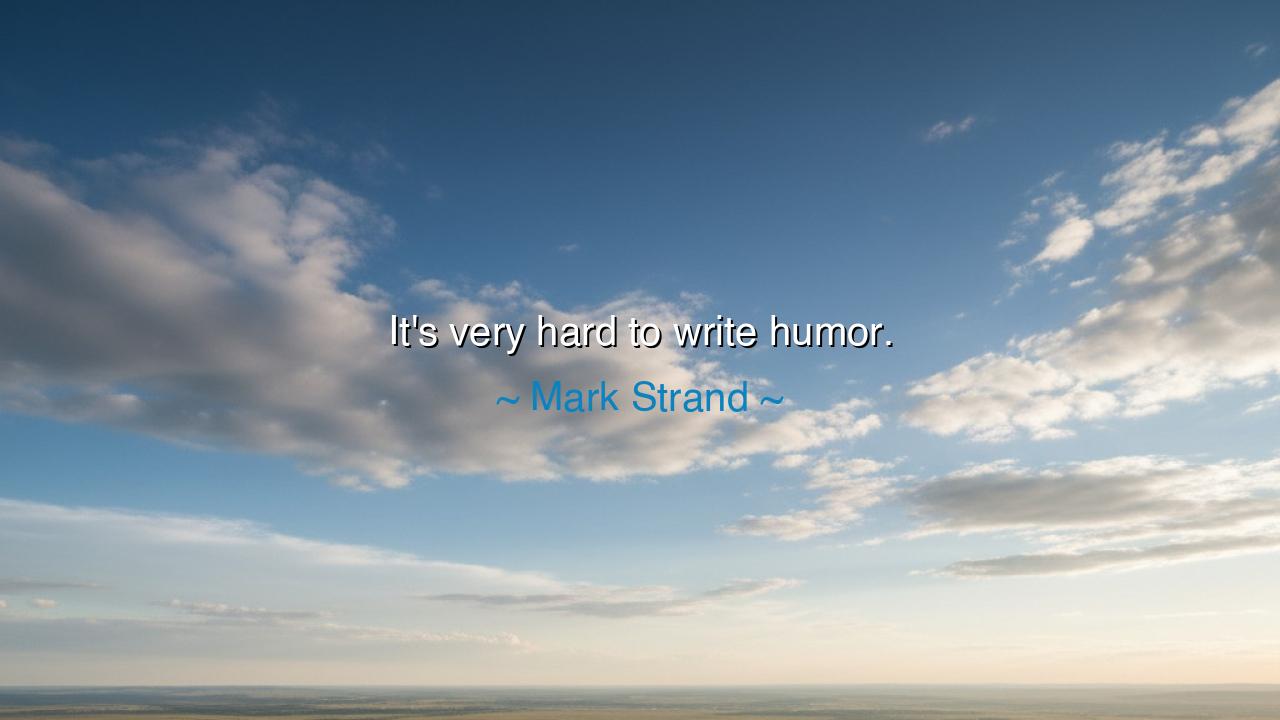
It's very hard to write humor.






"It's very hard to write humor." These words, spoken by Mark Strand, speak to a deep and profound truth about the nature of humor—that it is not a mere tool of entertainment, but a craft that requires skill, precision, and great emotional depth. Humor, though often lighthearted and full of joy, carries within it the weight of humanity itself. It is not simply the punchline, the quick-witted quip, or the clever twist of phrase; humor is the reflection of the human condition, of our struggles, our follies, and our triumphs. Writing humor, then, is not an easy task, for it requires the writer to understand not just the mechanics of comedy, but the soul of the audience, the balance between light and shadow, laughter and tears.
In the ancient world, the role of humor was not just to amuse, but to illuminate. The Greek playwrights, particularly Aristophanes, were known for their ability to weave humor with deep social commentary. His plays, while filled with witty dialogue and ridiculous situations, also exposed the vices and hypocrisies of Athenian society. Aristophanes' humor was a mirror, one that reflected not only the follies of the world but the deeper truths about human nature. But this was no easy feat. The fine line between satire and cruelty, between humor and insight, is one that must be tread with great care. To write humor that reveals without mocking, that uplifts without belittling, requires the wisdom of a philosopher and the courage of a warrior.
Mark Strand’s words echo the timeless challenge faced by those who seek to capture the essence of humor in writing. Humor, after all, is not simply the making of jokes but the weaving of a story or moment that strikes at the very heart of the human experience. To capture this in words is an act of both great vulnerability and great skill. The writer must not only understand the subtleties of human behavior but must also have the courage to face the darker aspects of life, knowing that humor has the power to heal as well as to harm. The ancient storytellers, such as Homer and Virgil, understood that the most powerful humor often arose from the most tragic circumstances—where pain and joy were intimately intertwined.
Consider the story of Diogenes, the philosopher of ancient Greece, who was known for his sharp wit and his unconventional behavior. Diogenes would often mock the pretensions of society, using humor to expose the hypocrisy and excess of the wealthy and powerful. One of his most famous acts was walking through Athens with a lantern, claiming to be looking for an honest man. His humor was not merely for amusement—it was a weapon, a means of cutting through the veils of illusion and falsehood. Yet, Diogenes’ humor was not without risk. In mocking the powerful, he invited their ire, knowing that the truth, when delivered too sharply, could be a dangerous thing. Writing humor, as Diogenes demonstrated through his actions, is an act of bravery, a way of revealing truths that others may not want to hear.
The difficulty in writing humor, as Strand so wisely points out, lies in the need to balance lightness with depth, joy with sorrow. The greatest humor is born from the tension between these two extremes. Consider the comedian or the satirist who uses humor to expose the truth of the human condition. This person must tread carefully, for their words can either lift others to a higher understanding or wound them with unintentional cruelty. The ability to write humor that touches the soul, that connects people through shared experience, is a rare gift. To create humor that heals rather than divides, that brings clarity rather than confusion, requires the writer to be not only a master of language, but a master of compassion.
In our own lives, we can learn much from Mark Strand’s observation. Humor is not just for entertainment, but for connection, for understanding. To write humor, or to speak humor, with true depth, we must first understand the complexity of the world around us. We must be willing to look at life with honesty, to see the moments of absurdity and tragic beauty that exist within us all. The humor that connects us is not that which mocks or belittles, but that which reveals the shared humanity we all experience. Like the great humorists of the past, we must strive to balance the light with the dark, knowing that both are necessary to understand the fullness of life.
The lesson we take from Mark Strand’s words is that true humor is not a mere accident of words, but a purposeful act that requires both skill and empathy. It is not about crafting a joke or a clever turn of phrase—it is about capturing the complexity of the human experience and offering it back to the world with compassion and insight. So, let us be intentional in our humor, using it not just for personal amusement but as a tool to connect, to heal, and to reveal the truths that lie hidden beneath the surface of our lives. In doing so, we honor the great tradition of those who have come before us—those who, through their wit and wisdom, have shaped the world’s understanding of itself.






AAdministratorAdministrator
Welcome, honored guests. Please leave a comment, we will respond soon